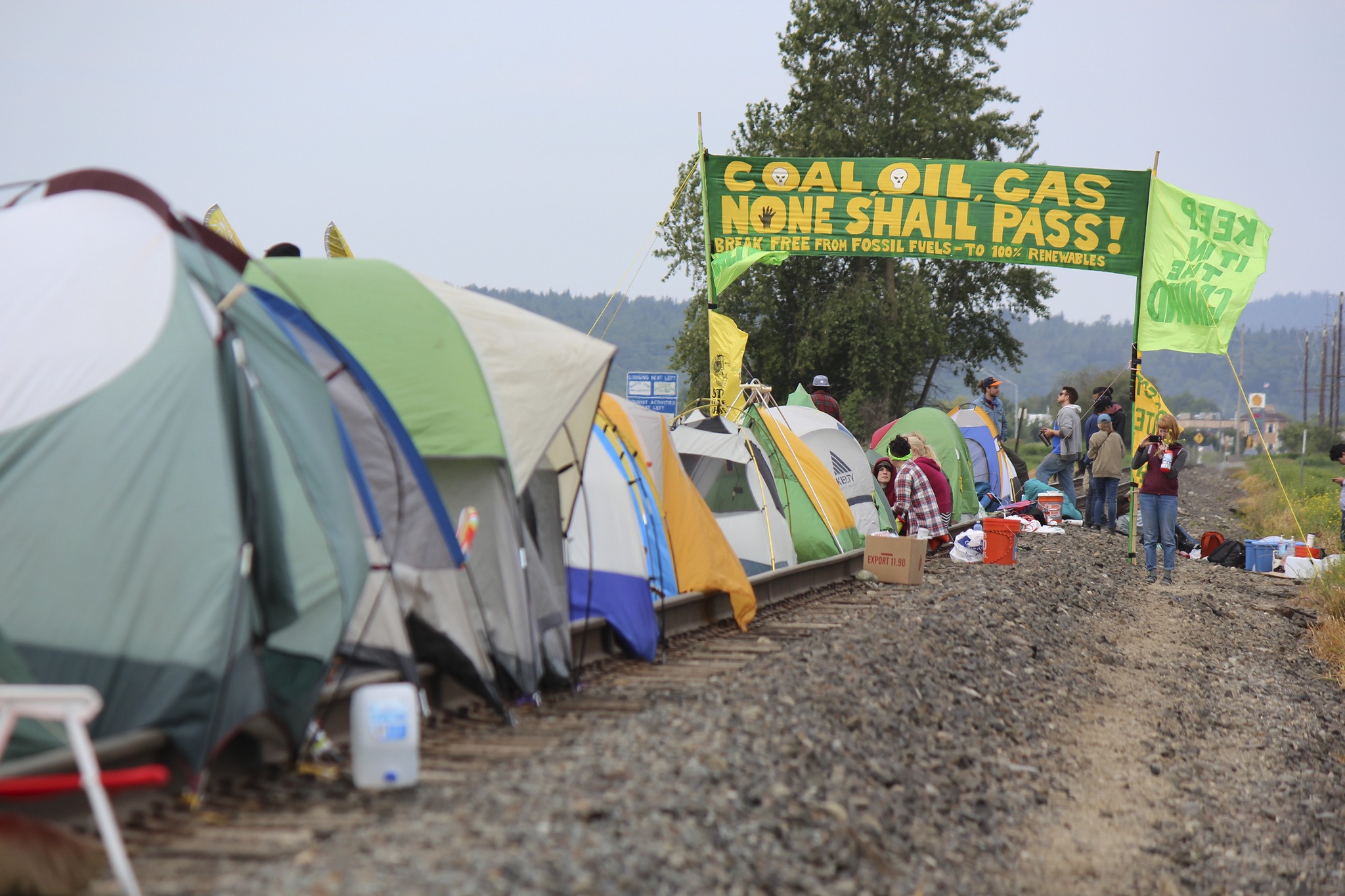Senator Doug Ericksen, R-Ferndale, sent out a press release Wednesday that announced a bill his office is developing for the next legislative session: A new law against so-called “economic terrorism” that would make civil disobedience a class C felony. Specifically, the “timely measure” would be applied when “protests aimed at economic disruption jeopardize human life and property.”
Ericksen was President-elect Donald Trump’s deputy campaign director in Washington. As a result, some have assumed this proposal is specifically aimed at the anti-Trump protests taking place across the state. But Ericksen told the Seattle Times that this was something he’d been thinking about for a while, and that he’s aiming this effort, specifically, at environmental activists.
According to the Times, “Ericksen said he was aiming at punishing environmentalists, tribal activists and others who have obstructed oil and coal trains, pipelines and similar projects,” and then added, as if addressing protesters: “I completely support your First Amendment right to protest. You do not have the First Amendment right to block a train.” (Seattle Weekly has a call out to Senator Ericksen.)
What this assumption ignores is that blocking a train is not protected by First Amendment rights. It is against the law, and that is the very definition of civil disobedience. Climate activists know full well that sitting on oil train tracks, or shutting off a pipeline valve, will incur criminal penalties. That is, in part, why they do it.
“We’re not going to get the changes made that need to get made to avoid a climate meltdown,” activist Patrick Mazza told Seattle Weekly this spring, “Unless people raise a really large ruckus.” Mazza was one of the “Delta 5” who blocked an oil train in 2014 and faced criminal trespass charges in January. He and the other four activists involved leveraged a “necessity defense” for their actions and, in the end, walked away with minimal fines. But they risked jail time, and tougher penalties.
The Delta 5 was just one such action this year in Washington. It’s been a big year for climate disobedience — that is, law-breaking in the name of climate change — not just for rallies and marches. Of those who blocked train tracks near Anacortes in May as part of the “Break Free” protest, 52 were arrested and now face second-degree criminal trespass charges. Climate change protesters on train tracks in Bellingham and Vancouver have also been arrested and face charges of second-degree criminal trespass. The anti-fracking protesters in Olympia this week are likely to be arrested soon and charged with criminal trespass, too.
Perhaps “criminal trespass,” which is a misdemeanor, is not a strong enough penalty for Ericksen, whose bill suggests such charges should be felonies instead. If Ericksen’s bill were to pass next year, it could certainly have a chilling effect on activism of all kinds. What seems especially Draconian is the proposal’s promise to penalize the organizations that sponsor or fund such protests — not just the protesters themselves. The proposal “appear[s] to be targeting civil disobedience as ‘terrorism,’” says ACLU of Washington spokesman Doug Honig. “That’s the kind of excessive approach to peaceful protest that our country and state do not need. Let’s keep in mind that civil rights protesters who sat down at lunch counters could be seen as ‘disrupting business’ and ‘obstructing economic activity,’ and their courageous actions were opposed by segregationists as trying to ‘coerce’ business and government.”
Still, at least one climate protester in Washington has, in fact, been charged with felony offenses for his actions. Climate Disobedience Center co-founder Ken Ward, who joined four other activists last month in a cross-country shutdown of five major pipelines that bring oil from Alberta’s tar sands into the U.S., could face decades in prison.
On October 11, Ward walked across a field, cut a fence chain, and closed a safety valve on the TransMountain pipeline, which pumps tar sands oil to Anacortes refineries. He is now facing three felony charges and one misdemeanor charge — a total maximum punishment of 30 years and 90 days imprisonment. The felony charges are class B felonies, which each bring a ten-year sentence. Among them: “criminal sabotage” and “assemblage of saboteurs,” antiquated state laws that Ward says lawyers have told him are extremely unusual. (Even more unusual, perhaps, is that the documentary filmmakers who were also there that morning to capture the event once faced identical charges; those charges have since been dropped).
But they still stand against Ward. He’ll face trial in Mt. Vernon in January, where he, like the Delta 5, will present a “necessity defense”: law-breaking is necessary to confront persistent inaction on climate change.
“We are in final-stage collapse, with horrendous news coming daily” about the climate, he says. “We are at the point where … staying within polite discourse has no effect. I’ve been doing this for 20 years. I’ve availed myself of every available legal alternative. Nothing has been effective. When you get to that point, what’s left? If you’re, like me, driven to do something, you put your body in the way of the harm. That’s what I did.”
Ward also notes that Ericksen’s proposal centers its critique on the idea of “economic” disruption, as if that’s the point of these sorts of protests. It’s not. “The point of climate direct action is to actually stop the burning” of fossil fuel, he says. “Burning this stuff is what needs to be stopped.”








